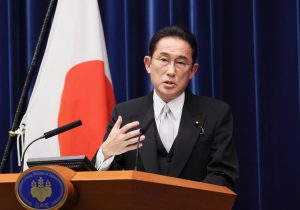Japan’s annual Diet session is set to commence on January 23. Among some of the key policy and legislative agenda items, the Kishida government’s proposed increase in Japan’s defense budget will be one of the most critical decisions at the session.
At the end of last year, the Kishida administration approved a record draft budget of 114 trillion yen ($865 billion) and announced plans to increase its defense budget to about 43 trillion yen ($312 billion) over the next five years. The government has proposed raising its annual defense budget from the current 1 percent of GDP to 2 percent in order to align with the NATO standard. The question, though, is how will the Kishida government fund this significant increase in defense spending?
One of the plans is to secure extra revenue by introducing expenditure reforms, selling national assets, and raising corporate, income, and tobacco taxes. Under the proposal, the corporate tax rate will not be changed, but a surcharge of 4 to 4.5 percent will be added to the existing tax, which is estimated to bring an additional 700 billion yen in revenue. Most small- and medium-sized companies are likely to be exempted from the proposed corporate tax hike; the surcharge will be applied to less than 6 percent of companies and other large enterprises.
Furthermore, the “special income tax for reconstruction” imposed to reconstruct Japan’s northeast will be lowered by 1 percent, but a new 1 percent tax would go to the defense budget – effectively keeping the tax rate the same but redistributing the money. Finally, the tobacco tax will be raised by around 3 yen per cigarette, generating another 200 billion yen.
But the proposed changes have drawbacks.
A corporate tax hike could force companies to reconsider wage increases, as encouraged by the Kishida administration, and this is not consistent with Kishidanomics. There have also been concerns that an income tax hike to support the defense budget would negatively impact the living standard of low-income earners.
As for the idea of shifting some of the reconstruction tax to the defense budget, that has predictably raised concerns of people in disaster-affected areas. Reconstruction Minister Akiba Kenya stated that “even if the reconstruction tax is halved, the government will make efforts to ensure the total amount of support won’t change by making use of the levy’s extension” – but extending the temporary tax hike might be unpopular.
Only the tobacco tax hike is considered to be relatively painless for taxpayers in Japan, although there will be significant opposition by the tobacco lobby and also by Diet members who belong to the alliance of LDP smokers (jiminto tabako giinrenmei) as well as by the bipartisan parliamentary league for smokers (mokumokukai).
More fundamentally, most of the Japanese public does not support a tax hike to fund the defense budget. According to a December 2022 Asahi Shimbun survey, the approval rating for the Kishida Cabinet sharply plummeted to 31 percent following discussion on a possible tax hike for defense spending. The survey showed that although most respondents opposed the defense budget increase, a majority of them nevertheless supported the proposed acquisition of “counterstrike capabilities.” In essence, while most Japanese support expanded defense capabilities, they are reluctant to accept any tax hike to cover the defense budget increase.
Notably, concerns about Kishida’s tax hike proposals were raised by his own economic security minister, Takaichi Sanae. Takaichi noted her opposition in a tweet, saying that she “can’t understand the prime minister’s true intentions in making a statement that may chill mindsets over raising wages at this time.” Indeed, although the Kishida government is urging companies to increase wages, the corporate tax hike would discourage companies from making such a decision. Takaichi did not submit her resignation to oppose the prime minister’s plan, but her serious objection could be regarded as a disagreement within the Kishida Cabinet.
On the other hand, Komeito, frequently described as a “dovish” coalition partner of the Liberal Democratic Party (LDP), eventually abandoned its cautious attitude toward the defense budget increase and supported Kishida’s tax hike plan.
Given the lack of agreement and both internal and external opposition to the tax hike plan, the Kishida government has not decided on when or whether to increase taxes. This issue will intensify and attract much opposition, leading to heated parliamentary deliberations.
The easiest course for Kishida is to issue government bonds. However, that would only increase debt of future generations, and hence the Ministry of Finance, in particular, would be hesitant to accept the issuance of more bonds. Oguro Kazumasa, a professor at Hosei University, has pointed out that the issuance of government bonds for the defense budget increase would seriously undermine Japan’s financial foundation. So far, Kishida has not made a strong case to the public, and much confusion prevails.
Amid these political divisions, how secure is the Kishida government? In December last year, Kishida had announced that he might dissolve the lower house and call a snap election before raising taxes to fund the defense budget increase. However, this suggestion was not popular, and he quickly modified his plan by stating in January 2023 that he would dissolve the House of Representatives and call a general election “at an appropriate time.”
For Kishida, the most “appropriate” and strategic timing for a general election would be soon after the successful hosting of the G-7 Hiroshima Summit to be held in May this year. This is because the cabinet approval rating for the Kishida administration could significantly rise after the summit.
Kishida’s judgment on how to fund the defense budget increase will be a critical factor in his survival as prime minister. For this reason, a broadly acceptable decision on the tax hike for the defense budget as well as diplomatic success at the summit would serve as a strong tailwind for Kishida at the next lower house election, which might be held sometime this year. However, how Kishida performs at the election is anyone’s guess at this stage.













